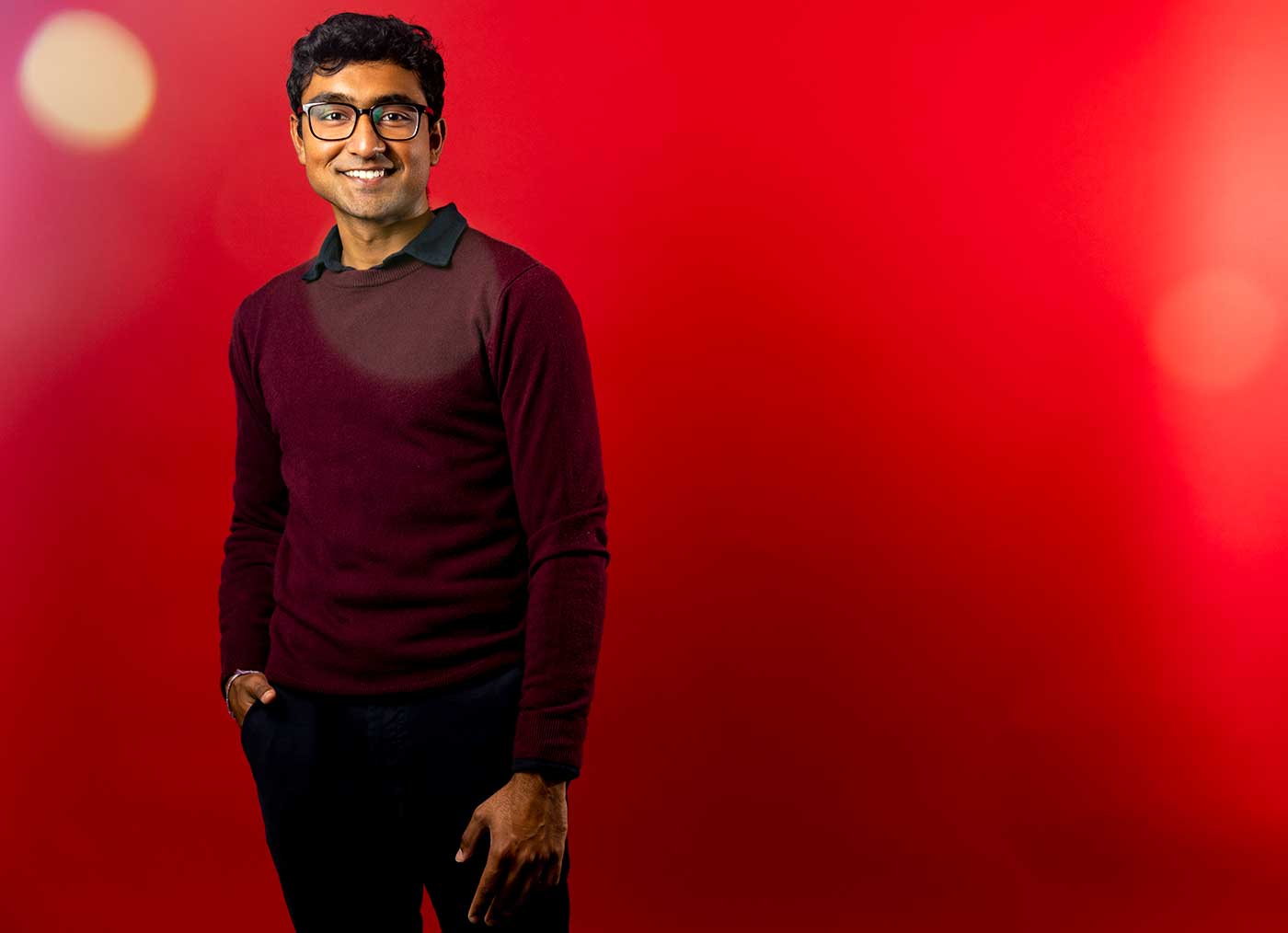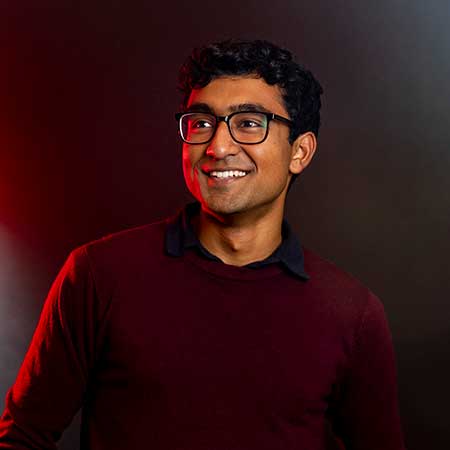Bio-inspired, data-driven, Dublin-bound: Vivek Kanpa wins Mitchell Scholarship
Author: Attrayee Chakraborty
Date: 12.06.22

One January evening, as he compiled his code for the tenth time, Vivek Kanpa smiled to himself when a program he wrote to analyze massive amounts of molecular data finally yielded a hit. He was amazed at what unfolded in front of his eyes: there was a potential way to find new protein targets for cancer immunotherapies using data science. He could use personalized medicine to help solve the world’s most unsolvable problems, and he could achieve this by marrying data science with biology.
Kanpa, now a fourth-year student, had been looking for a way to bridge the problem-solving gap between computer scientists, clinicians, and biologists in precision medicine research. So when he heard about the George J. Mitchell Scholarship, it was a no-brainer: he had to apply.
The Mitchell Scholarship is funded by the United States and Ireland, and gives Americans aged 18–30 the opportunity to pursue a fully funded year of postgraduate study in Ireland or Northern Ireland. Kanpa has been nominated as one of twelve scholars in the 2024 class, and his motivation is clear.
“I knew this could accelerate my goals in working at the interface of data science and biology,” Kanpa said. “Going to University College Dublin next year for a fully funded program on artificial intelligence in medicine will give me access to state-of-the-art biopharmaceutical resources, specifically in Ireland, where personalized and equity-based healthcare seems to be the next generation of medicine.”
Kanpa always had a penchant for biology, but not always for computer science.
“Despite both my parents working in computer science, I didn’t feel it was for me, even in high school,” Kanpa said. “Khoury College’s approach to teaching computer science to a diverse audience is what pulled me in. The coursework was applied to other disciplines such as biology and environmental science, which changed my outlook towards computer science. Khoury College has enabled me to combine healthcare and data science; I never really felt that I was working on computer science in isolation.”

Soon, Kanpa found himself pursuing a double major in data science and biology along with a minor in math. Besides the class experience, Khoury College’s co-op program was instrumental in fueling his ambitions. In his first co-op with Takeda’s Global Biologics team, Kanpa performed a lot of data automation, web development, and software development.
While questing for innovative solutions at Takeda, Kanpa was exposed to Northeastern’s Apfeld Lab, commonly called the “Worm Immortality Team” because of its work on neuronal tissue aging in a species of tiny worm called C. elegans. Kanpa found a high similarity between the lab’s data processing and his Takeda work, and he soon joined the lab, where he improved the team’s Pharedox software package to automate processing for massive chunks of high-throughput data. This software was used to generate intensity maps of the worm’s morphology, which plays a role in understanding the neuroendocrine signaling that protects humans from diseases like Alzheimer’s.
“Again, I found myself working at the interface of biology and data science to ask questions previously impossible without computer science,” Kanpa said. “I was always interested in making an impact on healthcare, and using my skill set in computer science helped me to stay at the forefront of cutting-edge research.”
Kanpa notes that Northeastern faculty have supported and motivated him immensely. He specially credited College of Science Professor Javier Apfeld, who encouraged him to apply for opportunities such as the PEAK Experiences Trail-Blazer Award. This award supported Kanpa’s part-time research on oxidative stress mechanisms, and it helped him compare his work with already-generated data to his work creating new data during lab experiments. Kanpa believes it was the turning point in his career, the moment he first carved a niche for himself at the intersection of biology, machine learning, and big data.
READ: Combining health research with CS, Devashish Sood earns PEAK Experiences Award
Armed with this multidisciplinary kit, Kanpa ventured forth to his current co-op at Revolution Medicines, where he works to predict drug permeability and unlock potential cancer treatments, all using a machine learning process called Graph Convolutional Networks.
“At Takeda, I was fully grounded in data science, specifically automation. I never set foot in biology labs or saw how experiments worked,” Kanpa said. “That is why I applied to RevMed; I wanted to get hands-on experience in labs. I wanted to learn directly from everyone at RevMed.”
Getting into a lab with little experience in hands-on bench work was a challenge, but Kanpa’s RevMed teammates brought out the best in him.
“This co-op made me realize my work values,” he noted. “I have learnt things about myself such as knowing where I’d thrive, what I value, and what my priorities are.”
To Kanpa, winning the Mitchell Scholarship feels like the culmination of years of classroom study and all he’s learned in co-op. He hopes to pursue a doctorate in developing computational tools and machine learning models to make precision medicine the new reality, and thinks the scholarship will help him become even more curious.
“I think about the kindness, patience, and enthusiasm that my mentors and professors showed me; this is as much their achievement as it is mine,” Kanpa said. “Representing Northeastern and my mentors is a big honor, but at the end of the day, I’m just a science nerd trying to think differently about the data we have to answer the same questions as everyone else.”